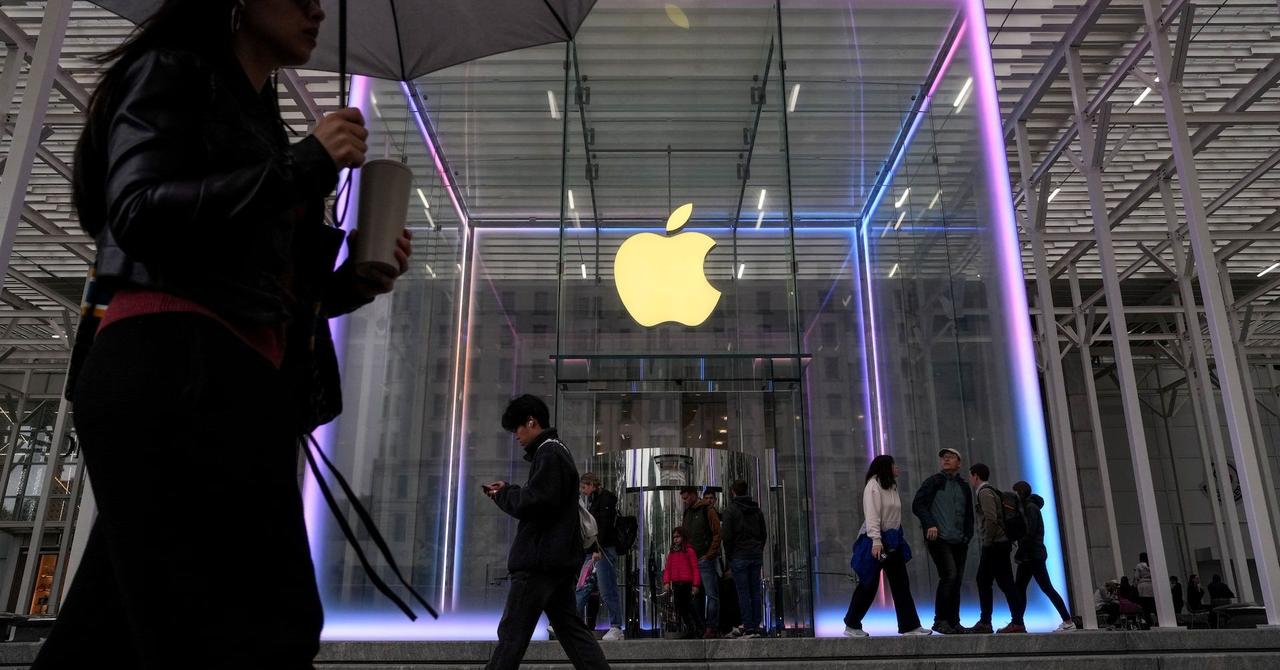Apple's 'Best Quarter Ever' Disappoints as AI-Enhanced iPhone Fails to Spark Sales Surge
2 Sources
2 Sources
[1]
Apple's 'Best Quarter Ever' Leaves Much to Be Desired
Apple Inc. described its latest results as its "best quarter ever," but that's only true if you stop reading near the top of the press release issued Thursday evening. Overall revenue may have reached record levels, but big questions lurk about large parts of the iPhone maker's business. First and foremost, the artificial-intelligence sales "supercycle" predicted to follow the launch of the first AI-enhanced iPhone has not materialized and shows no sign of showing up soon. The iPhone missed expectations in the fiscal first quarter ended Dec. 28, falling 0.8% from the same period a year earlier to $69.1 billion compared with the $71 billion anticipated by Wall Street. That's not what investors thought would happen following the launch of the company's first AI-enabled phone.
[2]
Apple's 'best quarter ever' leaves much to be desired
Apple Inc. reported record overall revenue for its fiscal first quarter but missed iPhone sales expectations by $1.9 billion. The company faced challenges with its AI-enhanced iPhone features and a decline in wearables segment revenue. While optimistic about future services revenue and new device launches, Apple remains concerned about its volatile China market and upcoming tariffs.Apple Inc. described its latest results as its "best quarter ever," but that's only true if you stop reading near the top of the press release issued Thursday evening. Overall revenue may have reached record levels, but big questions lurk about large parts of the iPhone maker's business. First and foremost, the artificial-intelligence sales "supercycle" predicted to follow the launch of the first AI-enhanced iPhone has not materialized and shows no sign of showing up soon. The iPhone missed expectations in the fiscal first quarter ended Dec. 28, falling 0.8% from the same period a year earlier to $69.1 billion compared with the $71 billion anticipated by Wall Street. That's not what investors thought would happen following the launch of the company's first AI-enabled phone. The launch was imperfect. Apple didn't have the features ready in time, leading to some inventive marketing workarounds -- billboards said the latest iPhone was built "for" Apple Intelligence rather than "with." Even when features started to be rolled out, users didn't experience anything life-changing that would tempt enough people on the fence about an upgrade. Also Read: Apple set December quarter record in India: CEO Tim Cook Siri remained as clunky as ever, and the headline from Apple's AI efforts so far has been its clumsiness in summarizing notifications. It keeps getting basic details wrong, and in a recent update, Apple disabled aspects of it. (The company didn't mention it on Thursday.) Speaking to analysts, Chief Executive Officer Tim Cook said that iPhone sales were stronger in places where its AI had been made available compared with those markets yet to get it. Furthermore, he stressed that some features were available only in those places from mid-December -- right near the end of the quarter. Fair enough, but optimism for this current quarter seemed muted as well. Another trouble spot on the innovation front was the revenue decline for the wearables segment, which includes the new Vision Pro headset. Sales were down year-on-year by 1.7%. Of course, the Vision Pro was never going to be a big seller. But the overall segment drop stood out because it includes AirPods and Apple Watch, both popular Christmas gifts that were given an upgrade last year. Things might pick up in 2025 with the launch of the iPhone SE. Bloomberg's Apple beat reporter Mark Gurman predicts the device will, at $500, attract Android users who want a cheaper way into the largely superior iOS experience. This, in turn, offers a chance to bump services revenue further as those new customers fork out for Apple TV or storage and start to use in-app payments. The services business was a highlight of the quarter -- up 14% year-on-year. Bigger picture, the volatile state of Apple's business in China continues to defy prediction. Sales were down 11%, attributed to inventory challenges, Apple said. When asked if the company was concerned about any incoming Trump tariffs, Cook said the company was monitoring but would not discuss further. What happens to Apple's China business is anyone's guess. After-hours trading suggested investors aren't overly concerned about all this; shares rose as much as 3%. The shareholders were placated, it seems, by positive overall revenue growth outlook for the current quarter, somewhere in the low-to-mid single digits. Still, I think it's a poor outing and should reinforce broader doubts over what Apple offers in terms of innovation, particularly AI. Tellingly, when one analyst asked whether Apple would offer "agentic" AI that can perform tasks for users, Cook had little to say despite it being a clear focus for his competitors. The good news is that Apple has a durable moat of 2.35 billion devices in use, all locked into a highly popular ecosystem that feels almost impossible to leave. None of the AI competitors are likely to come up with better consumer hardware than those engineers in Cupertino. For that reason, the iPhone, iPad, and Mac remain extremely fine machines -- the best available for today's needs or for accessing AI made by companies other than Apple. We'll see how long Wall Street is happy for that to be the case.
Share
Share
Copy Link
Apple's latest financial results, despite being called its "best quarter ever," reveal disappointing iPhone sales and raise questions about the company's AI strategy and innovation in a competitive tech landscape.

Apple's Record Revenue Overshadowed by iPhone Sales Miss
Apple Inc. recently announced its fiscal first-quarter results, describing them as the "best quarter ever"
1
. However, despite reaching record overall revenue levels, the tech giant's performance has left investors and analysts with significant concerns about key aspects of its business, particularly its AI strategy and iPhone sales.AI-Enhanced iPhone Fails to Deliver Expected Sales Boost
The much-anticipated "supercycle" of sales following the launch of Apple's first AI-enhanced iPhone has failed to materialize. iPhone sales in the fiscal first quarter ended December 28 fell short of Wall Street expectations, declining 0.8% year-over-year to $69.1 billion, compared to the anticipated $71 billion
1
. This disappointing performance has raised questions about the effectiveness of Apple's AI features and their ability to drive upgrades.Challenges in AI Implementation and User Experience
The launch of AI features on the iPhone faced several hurdles. Apple struggled to have all features ready in time, resulting in marketing workarounds such as advertising the iPhone as built "for" Apple Intelligence rather than "with" it
2
. Even after the rollout, users reported underwhelming experiences, with Siri remaining "clunky" and AI-powered notification summaries proving problematic, leading Apple to disable certain aspects of the feature.Wearables Segment Decline and Vision Pro Impact
Another area of concern is the wearables segment, which includes the new Vision Pro headset, Apple Watch, and AirPods. This segment experienced a 1.7% year-on-year decline in revenue
2
. While the Vision Pro was not expected to be a high-volume seller, the overall segment drop is noteworthy, especially considering recent upgrades to popular products like AirPods and Apple Watch.Services Business: A Bright Spot Amidst Challenges
On a positive note, Apple's services business showed strong growth, with revenue increasing by 14% year-on-year
2
. This segment's performance offers a silver lining and potential for future growth, particularly as Apple looks to expand its ecosystem and attract new users.Related Stories
China Market Volatility and Future Outlook
Apple's business in China continues to face volatility, with sales down 11% in the region
2
. The company attributed this decline to inventory challenges. Additionally, concerns about potential Trump tariffs loom over Apple's future performance in this crucial market.Innovation and AI Strategy Questions
The lackluster performance has reinforced doubts about Apple's innovation capabilities, particularly in AI. When asked about offering "agentic" AI that can perform tasks for users, CEO Tim Cook provided limited insight, highlighting the gap between Apple and its competitors in this rapidly evolving field
2
.Despite these challenges, Apple maintains a strong position with 2.35 billion devices in use and a loyal ecosystem. However, the company's ability to innovate and compete in the AI space will be crucial for its future growth and market position.
References
Summarized by
Navi
Related Stories
Recent Highlights
1
ByteDance's Seedance 2.0 AI video generator triggers copyright infringement battle with Hollywood
Policy and Regulation

2
Demis Hassabis predicts AGI in 5-8 years, sees new golden era transforming medicine and science
Technology

3
Nvidia and Meta forge massive chip deal as computing power demands reshape AI infrastructure
Technology








